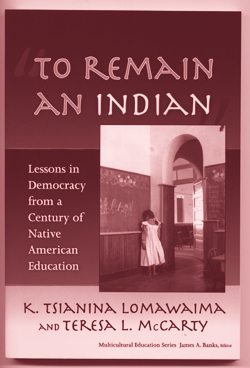To Remain an Indian
"Each and every [Lakota] parent was a teacher and 'all elders were instructors of those younger than themselves'. We learned by watching and imitating examples placed before us. Slowly and naturally the faculties of observation and memory became highly trained-'The training was largely of character' - and continued through life. True Indian education was based on the development of individual qualities and recognition of rights." - Luther Standing Bear (Lakota)
Too often, official history has silenced and pushed aside the voices and experiences of Native Americans.
A portrait of the journey of American Indian education over the past century, To Remain an Indian (TC Press, 2006) takes readers from instruction in Native homes and languages, to a critical evaluation of U.S. education policies and practices from the early 20th century, when schools were the center of efforts to "civilize" Natives, through the contemporary standards movement, which has led to the call for indigenous counter-standards and culturally responsive schools. In the process, the authors refute the notion of American Indians as one-dimensional learners and demonstrate the complexity of indigenous education as "language-rich, consciously designed systems based on indigenous theories of intellect and emotion." Also covered are the initiatives of the late 1960s and 1970s in which Native communities began to change Indian education from the inside out, developing their own bilingual and bicultural teaching staff, curricula and pedagogies.
Published Wednesday, Dec. 13, 2006
